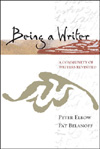Workshop 10
On Interviewing Writers
Major online bookstores -- including Amazon.com and Barnes and Noble, -- regularly feature links to interviews with famous writers. Why is it that readers are so interested in interviews with writers? Perhaps . . . - it is easier to hear the voice of the writer when his or her actual words are being quoted; or
- we trust the author's assessment of his or her craft more than that of a journalist or academic who studies a writer; or
- maybe we hope that the unpredictable nature of dialogue will reveal something about the author that he or she wouldn't ordinarily reveal.
We'd like for you to freewrite for a little bit about which qualities of an interview are appealing to you. In your freewriting, you may discover that you don't really like to read interviews, that you avoid them whenever you are flipping through a magazine. If so, make sure you consider why you avoid them: Do they provide too little information? Do they seem too informal? Whatever the reason, you should be aware of this before you begin the main activity for this workshop.
Main Activity Once you've done some freewriting about interviews, we'd like for you to explore a few sites that feature interviews on the web. You can start with the links listed below, or you can use a search engine to find others. But try to find interviews with subjects who perform some kind of writing, whether it is screenwriting, song lyrics, advertising slogans, or novels. The following list will help you get started: We want you to select two interviews that interest you, in order to compare and contrast the method of interviewing employed. The interviewees need not be from similar occupations; we are less interested in WHO the people are than in HOW the interviews are conducted. Try to find interviews carried out in very different contexts -- for instance, one in a chat room and one over the phone -- or presented in very different mediums -- one which is exclusively text and one which has pictures and an audio file of the interview. When writing your essay, consider the following issues: - What can you find out about the person conducting the interview? Are his or her credentials publicized on the web site? On the basis of these credentials (or lack thereof) what can you say about the writer's experience?
- How does the transcript of the interview appear? Does the writer report ONLY the dialogue or does he insert information and observations about his subject? Does the interviewer provide information about gestures? Is there other information about what's taking place?
- How would you describe the interviewer's relationship with his or her subject? Are they personal friends? Colleagues? A distant admirer? Does the interviewer seem distant?
- Generally speaking, how does each interviewer attempt to control the interview? Do you see an agenda in the questions that he or she asks?
- To what extent does the interviewer’s question depend on information provided in the previous answer? In other words, does the interviewer seem to be working with a script of questions or do questions seem to arise from the conversation taking place?
- How successful is the interviewer in bringing out the voice of his or her subject? To what extent do you learn about the interviewee's personality?
Most importantly, you should be able to talk intelligently about the differences. How do each of these differences affect your reception of the interview? If you found one more entertaining than the other, what reasons might account for this? Strive to write at least three full paragraphs about these differences. This does not have to be your best writing, but you will be reading it to your classmates in your next class. When you return to class, break up into groups and read your compare and contrast essays to one another. If you have access to computers, have your group members look at the online interviews while you are reading your essay to them. Otherwise, print out copies of the interview for everyone to look at. While you are reading your essay, you may want to point out to your group members the passages of the interview that you are discussing. In your feedback to your group members' papers, follow the "Believing and Doubting" guidelines in the Sharing and Responding section of your textbook. |



 2003 McGraw-Hill Higher Education
2003 McGraw-Hill Higher Education